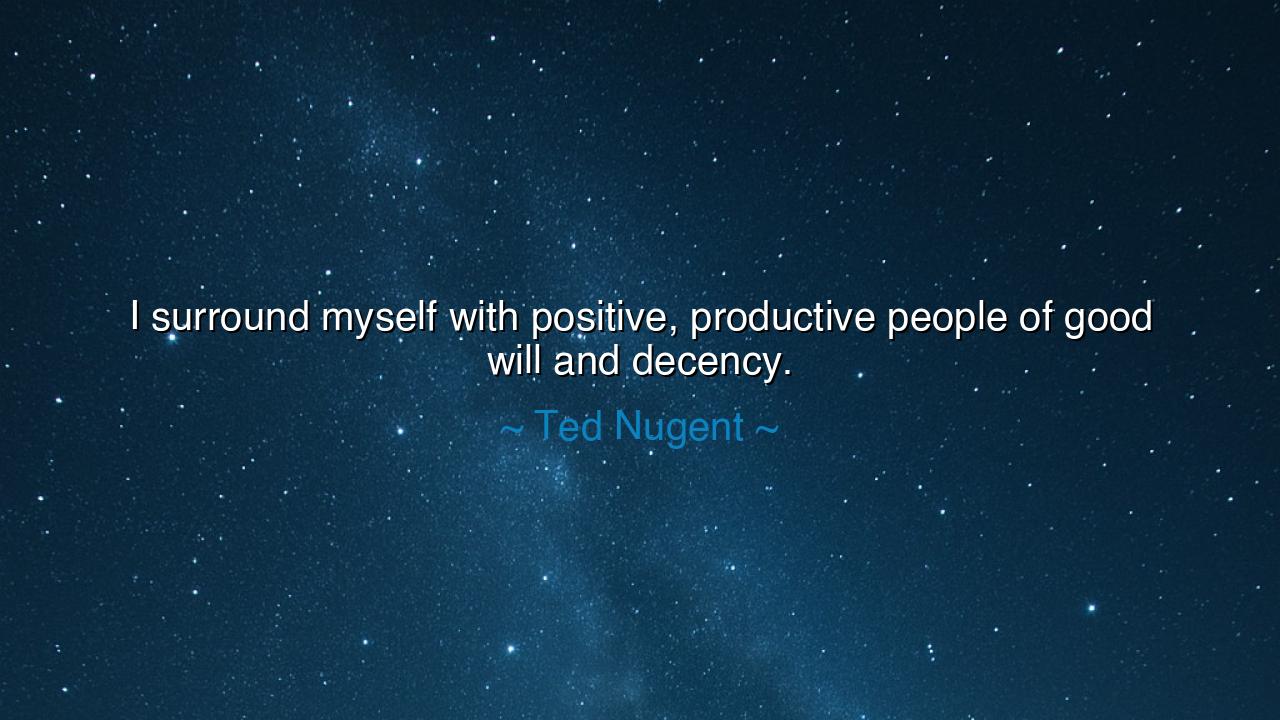
I surround myself with positive, productive people of good will






Hear, O seekers of wisdom, the words of Ted Nugent, who declared: “I surround myself with positive, productive people of good will and decency.” This is not merely a statement of preference, but a guiding principle, a shield of the spirit. For every soul is shaped by the company it keeps, just as a tree is shaped by the winds that surround it. The friends and companions who dwell near us are mirrors of our own spirit, feeding our strength or draining it, guiding us toward light or dragging us into darkness.
The meaning of this saying is rooted in the law of influence. No man, no woman, no child walks through life untouched by the spirits of others. To keep the company of the bitter is to become bitter; to walk among the corrupt is to learn corruption. But to dwell with the positive, the productive, the decent is to be lifted, strengthened, and refined. Nugent, whether in his art or his life, understood that the path of growth demands careful guardianship of the circle around one’s heart.
The origin of this wisdom lies in the ancient recognition that fellowship shapes destiny. The philosophers of Greece warned that character is molded by association. The Scriptures declared, “Bad company corrupts good morals.” The sages of the East taught that the lotus rises pure because it grows among clear waters. Nugent’s words are a modern echo of these eternal truths: to surround yourself with those whose spirit is good is to walk a straighter, nobler path.
Consider the story of George Washington, who carefully chose his circle of generals during the Revolution. He knew that victory would not come through numbers alone, but through the positive will, discipline, and integrity of those who stood by him. By surrounding himself with men of courage and honor, he turned a ragged army into a force capable of founding a nation. His example reveals the power of association: greatness flourishes among the great.
Think also of Florence Nightingale, who during the Crimean War gathered around her a band of nurses dedicated to good will and decency. Though the battlefield was filled with misery and death, her circle of compassion transformed despair into hope, filth into healing, and chaos into order. She proved that when one surrounds oneself with the right companions, even the darkest place can be illuminated.
O children of tomorrow, understand this: the people you welcome into your life are architects of your future. If you walk with the envious, you will breathe envy; if you walk with the dishonest, you will learn dishonesty. But if you walk with those who are positive, productive, and decent, their light will mingle with yours, and together you will rise. Your destiny is not forged alone but in fellowship, and your circle is the soil in which your soul grows.
Practical wisdom calls you: choose your companions with care. Seek out those who inspire you to labor with diligence, who remind you of kindness when you falter, who call forth your courage when you are afraid. Be also such a companion to others, so that you too may offer good will and decency to all who walk beside you. And when you find yourself among the destructive and the cruel, do not let them poison your spirit—step away, and guard the sanctity of your circle.
Thus remember the counsel of Ted Nugent: “I surround myself with positive, productive people of good will and decency.” Let it be your rule, your compass, your shield. For a life surrounded by the noble becomes noble itself. In this way you will not only rise to your own greatness, but also create a circle of light that nourishes others, until your fellowship becomes a beacon to the world.
––






PKThanh Pham Kaka
I’m struck by how intentional this approach seems. It raises questions about personal responsibility: do we create our circumstances by choosing our companions wisely, or is it more about adapting to the environment we are given? I also consider the ethical dimension: if everyone curated their social circles strictly by positivity and decency, what happens to those who are struggling to develop these qualities themselves? Can mentorship or exposure help, rather than exclusion?
ATAnh Tuan Anh Tuan
This statement makes me think about the psychological and emotional benefits of being around positive, productive people. Can their energy and mindset actively enhance our own motivation and decision-making? Conversely, I wonder if it implies that we should distance ourselves from anyone who doesn’t meet this standard, and whether such selectivity could create social isolation or judgmental attitudes. How do we maintain inclusivity while protecting our own well-being?
NTTran Thi Ngoc Thao
I appreciate the sentiment, yet it raises a practical question: how do we actively find and engage with such people in real life, rather than passively hoping they appear in our circles? I also wonder whether maintaining such relationships requires ongoing effort and boundaries to avoid being drained by those who do not share these values. How does one balance authenticity and discernment in building meaningful connections?
MXPham Minh Xuan
Reading this, I feel motivated to evaluate my own social network. How do we determine who truly embodies good will and decency, especially when appearances can be misleading? I also question whether surrounding oneself with positive people risks creating an echo chamber where challenges and dissenting perspectives are minimized. Can a diverse circle of viewpoints coexist with Nugent’s emphasis on positivity and productivity?
NCnguyen cuong
This quote makes me reflect on the importance of social environments in shaping behavior and mindset. I wonder how much of one’s productivity and positivity is influenced by the people around them versus individual discipline. Is it possible to maintain good will and decency in the company of negative or toxic individuals, or does Nugent’s approach suggest that we must curate our social circle to thrive?